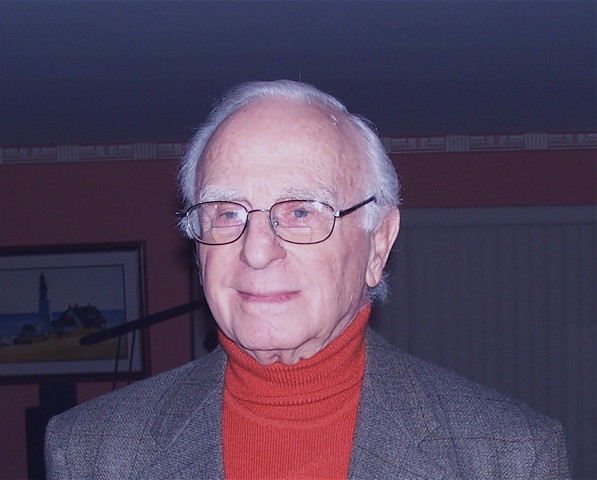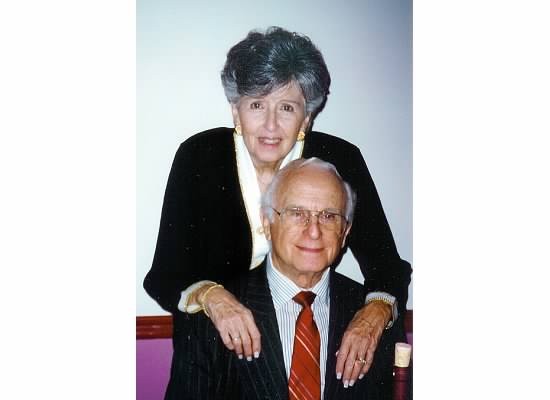Paul Keller,90, dies
A Holocaust survivor, decorated WWII vet, successful executive — and Herald columnist
Paul Keller, a 52-year resident of Rockville Centre, died on July 18, just weeks after moving to State College, Pa. He was 90.
Keller was born in Mainz, Germany, on Sept. 23, 1921. He completed his high school education in 1937. Because of the Nazi restrictions on Jews’ college education and employment and the grim outlook for Jews in Germany, his parents decided to send their 15-year-old son to live with his uncle in Brooklyn. Paul arrived in Hoboken, N.J., in late August 1937, on the S.S. Hansa, with $10 in his pocket.
Keller began his senior year at Alexander Hamilton High School in Brooklyn two weeks after arriving in the U.S. He became the goalkeeper for the school’s soccer team, and received a varsity letter after four months. That season, the team won the silver medal in the New York City Public School Athletic League championships. Keller’s English improved rapidly, and he graduated with good grades in June 1938.
Afterward, with his uncle’s help, he got a job in the garment industry as a delivery boy and shipping room assistant, despite the Great Depression. He was drafted into the Army in October 1942, and became a U.S. citizen at the district court in Spartanburg, S.C., during his basic training at Camp Croft, S.C.
In the spring of 1943, he joined A Troop, 8th Cavalry, a regiment of the 1st Cavalry Division, as a sniper/scout. That June, the division sailed from San Francisco for Brisbane, Australia, for six months of intensive combat and amphibious-landing training. That December, the 1st Cavalry moved to Oro Bay in New Guinea to prepare for the invasion and recapture of the Admiralty Islands to the north. Keller was in the first assault wave that landed on Manus Island, the Japanese stronghold in the island group, in March 1944. For their bravery, A Troop, which had a 50 percent casualty rate, was awarded the Presidential Unit Citation.
In October 1944, Keller was in the third assault wave to hit the beach on Leyte in the Philippines. His unit secured Tacloban, Leyte’s capital, and went on to recapture Samar Island from the Japanese. Later that year he was part of the task force whose mission was to rescue 3,700 American civilians imprisoned at the Santo Tomas and Bilibid internment camps in Manila. A fast-moving column penetrated Japanese-held territory 100 miles in one day to pull off the rescue mission, which Keller regarded as the highlight of his military career. In the street fighting that ensued, he was wounded slightly, and was awarded a Purple Heart and a Bronze Star for his actions in and around Manila.
After being one of the first American soldiers in Tokyo after the Japanese surrender in September 1945, Keller, by then a sergeant, was discharged two months later at Fort Dix, N.J.
Using provisions of the G.I. Bill of Rights, he enrolled in New York University in January 1946 and earned a degree in math two and a half years later. While at NYU, he was elected to Phi Beta Kappa and to Pi Mu Epsilon, the national mathematics honor society. He continued his education at Columbia University, earning a master’s in mathematical statistics in June 1949. Gen. Dwight D. Eisenhower, who was then the president of Columbia, conferred Keller’s diploma.
Afterward, he took a position in advertising as a marketing research assistant at the Biow Agency, one of the top 10 firms in New York at the time. Stints followed at N.W. Ayer & Son, ABC and Bryan Houston Advertising. In 1957 he joined Reach, McClinton & Co. as research director, and was promoted to vice president in 1959 and to director of research and media in 1960, and was elected to the board of directors two years later.
As the agency’s media director, Keller was instrumental in developing a series of original television dramas, written by emerging young American writers, for the Prudential Insurance Co., called “Prudential’s On Stage.” The first show, “Certain Honorable Men,” written by Rod Serling and starring Van Heflin and Peter Fonda, aired on NBC on Sept. 12, 1968. The second show, “Male of the Species,” starred Lawrence Olivier, Sean Connery, Michael Caine and Paul Scofield, and received even higher critical acclaim.
During his tenure at Reach, McClinton, Keller served as vice chairman of the research committee of the American Association of Advertising Agencies.
In 1969, he joined Ted Bates Advertising as associate research director, and was a senior vice president when he retired in December 1984.
During the mid-1970s, Keller was an adjunct professor at Hofstra University’s business school, where he taught courses in marketing research, decision theory and statistics. He was a frequent guest lecturer at university and industry symposiums, and wrote articles for newspapers, industry journals and trade papers. “Patterns of Media Audience Accumulation,” one of his papers in the April 1966 Journal of Marketing, represented a breakthrough in the way the industry looked at the “reach” of various media forms. The landmark study on which the paper was based showed, for the first time, a great similarity in the way various media attracted audiences.
While at Ted Bates, Keller developed a study for the Navy that tracked the attitudes of young men between ages 17 and 21 toward the military in general and the Navy in particular. The study, which was conducted twice a year, was known as the NAES study and became the bible for the Navy Recruiting Command’s assessments of attitudes and advertising effectiveness.
During the 1970s, Keller continued his involvement in soccer, coaching in the Rockville Centre youth program, which ultimately led to a stint as the club’s soccer commissioner.
After he retired, he ran a consulting business and volunteered for 20 years for the National Executive Service Corps, an organization of retired executives working as consultants for not-for-profit organizations. He also volunteered as the publicist for the Rosa Lee Young Childhood Center in Rockville Centre, and as a tutor at the Archer Street Elementary School in Freeport. He received an Unsung Hero award from the school and the Freeport Board of Education for his efforts.
Keller was a prolific guest columnist for the Herald, writing on a range of subjects, both personal and topical, in elegant prose that could be simultaneously touching and humorous. Among his more memorable columns was one written in February 2009, about how he first met and then remet Ruth Ettinghouse, the girl who would become his wife, “(Not) another Valentine’s Day story.” Another described his participation in a May 2007 graduation ceremony at NYU. A June 2009 column focused on his memories of D-Day, and others were about the Tanglewood Preserve, the Cradle of Aviation Museum and observations on a hospital stay.
A common theme throughout Keller’s work — his life’s work, perhaps — was the Holocaust. He was passionate about doing his part to prevent anything like it from happening again. In his writings and personal appearances, he recalled how anti-Semitism and the rise of the Nazis touched him, his family and, ultimately, 6 million Jews. He spoke to middle-school students and at Yom Hashoah Holocaust Remembrance commemorations at his temple, Central Synagogue of Nassau County.
He concluded an April 2011 speech by saying, “Today we join people all over the world and think of the millions who did lose their lives, and we shed our tears in remembrance. But what about tomorrow? When the last of the witnesses of this tragic period in history have become history themselves, the phrase ‘never again’ must continue to be the watchword for all Jews, nay for all people, forevermore.”
Paul is survived by Ruth, his wife of 64 years, and three children: Steven, an attorney for environmental law at the U.S. Justice Department; Richard, a computer scientist for NASA who is partnered with Jeffrey Prince; and Susan Vidmar, a business school instructor and administrator who is married to John and is the mother of two sons, Daniel and David. Keller is also survived by his brother, John, who lives in Manhattan with his wife, Margot, and their two grown children, Allen and Karen.
A funeral service was held in State College on July 20. Keller’s daughter said that donations in his memory may be made to the Rosa Lee Young Childhood Center, 180 North Village Ave., Rockville Centre, N.Y. 11570.

 41.0°,
Fair
41.0°,
Fair 







